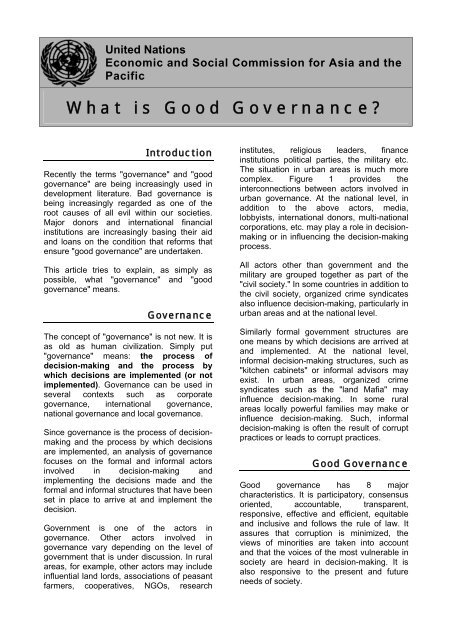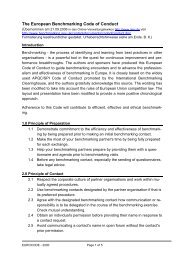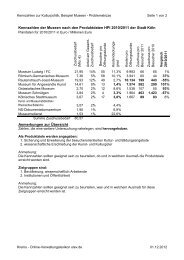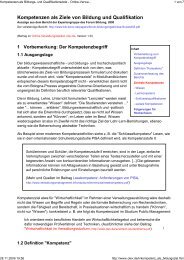What is Good Governance? - Escap
What is Good Governance? - Escap
What is Good Governance? - Escap
Create successful ePaper yourself
Turn your PDF publications into a flip-book with our unique Google optimized e-Paper software.
United Nations<br />
Economic and Social Comm<strong>is</strong>sion for Asia and the<br />
Pacific<br />
<strong>What</strong> <strong>is</strong> <strong>Good</strong> <strong>Governance</strong>?<br />
Introduction<br />
Recently the terms "governance" and "good<br />
governance" are being increasingly used in<br />
development literature. Bad governance <strong>is</strong><br />
being increasingly regarded as one of the<br />
root causes of all evil within our societies.<br />
Major donors and international financial<br />
institutions are increasingly basing their aid<br />
and loans on the condition that reforms that<br />
ensure "good governance" are undertaken.<br />
Th<strong>is</strong> article tries to explain, as simply as<br />
possible, what "governance" and "good<br />
governance" means.<br />
<strong>Governance</strong><br />
The concept of "governance" <strong>is</strong> not new. It <strong>is</strong><br />
as old as human civilization. Simply put<br />
"governance" means: the process of<br />
dec<strong>is</strong>ion-making and the process by<br />
which dec<strong>is</strong>ions are implemented (or not<br />
implemented). <strong>Governance</strong> can be used in<br />
several contexts such as corporate<br />
governance, international governance,<br />
national governance and local governance.<br />
Since governance <strong>is</strong> the process of dec<strong>is</strong>ionmaking<br />
and the process by which dec<strong>is</strong>ions<br />
are implemented, an analys<strong>is</strong> of governance<br />
focuses on the formal and informal actors<br />
involved in dec<strong>is</strong>ion-making and<br />
implementing the dec<strong>is</strong>ions made and the<br />
formal and informal structures that have been<br />
set in place to arrive at and implement the<br />
dec<strong>is</strong>ion.<br />
Government <strong>is</strong> one of the actors in<br />
governance. Other actors involved in<br />
governance vary depending on the level of<br />
government that <strong>is</strong> under d<strong>is</strong>cussion. In rural<br />
areas, for example, other actors may include<br />
influential land lords, associations of peasant<br />
farmers, cooperatives, NGOs, research<br />
institutes, religious leaders, finance<br />
institutions political parties, the military etc.<br />
The situation in urban areas <strong>is</strong> much more<br />
complex. Figure 1 provides the<br />
interconnections between actors involved in<br />
urban governance. At the national level, in<br />
addition to the above actors, media,<br />
lobby<strong>is</strong>ts, international donors, multi-national<br />
corporations, etc. may play a role in dec<strong>is</strong>ionmaking<br />
or in influencing the dec<strong>is</strong>ion-making<br />
process.<br />
All actors other than government and the<br />
military are grouped together as part of the<br />
"civil society." In some countries in addition to<br />
the civil society, organized crime syndicates<br />
also influence dec<strong>is</strong>ion-making, particularly in<br />
urban areas and at the national level.<br />
Similarly formal government structures are<br />
one means by which dec<strong>is</strong>ions are arrived at<br />
and implemented. At the national level,<br />
informal dec<strong>is</strong>ion-making structures, such as<br />
"kitchen cabinets" or informal adv<strong>is</strong>ors may<br />
ex<strong>is</strong>t. In urban areas, organized crime<br />
syndicates such as the "land Mafia" may<br />
influence dec<strong>is</strong>ion-making. In some rural<br />
areas locally powerful families may make or<br />
influence dec<strong>is</strong>ion-making. Such, informal<br />
dec<strong>is</strong>ion-making <strong>is</strong> often the result of corrupt<br />
practices or leads to corrupt practices.<br />
<strong>Good</strong> <strong>Governance</strong><br />
<strong>Good</strong> governance has 8 major<br />
character<strong>is</strong>tics. It <strong>is</strong> participatory, consensus<br />
oriented, accountable, transparent,<br />
responsive, effective and efficient, equitable<br />
and inclusive and follows the rule of law. It<br />
assures that corruption <strong>is</strong> minimized, the<br />
views of minorities are taken into account<br />
and that the voices of the most vulnerable in<br />
society are heard in dec<strong>is</strong>ion-making. It <strong>is</strong><br />
also responsive to the present and future<br />
needs of society.
Figure 1: Urban actors<br />
Participation<br />
Participation by both men and women <strong>is</strong> a<br />
key cornerstone of good governance.<br />
Participation could be either direct or through<br />
legitimate intermediate institutions or<br />
representatives. It <strong>is</strong> important to point out<br />
that representative democracy does not<br />
necessarily mean that the concerns of the<br />
most vulnerable in society would be taken<br />
into consideration in dec<strong>is</strong>ion making.<br />
Participation needs to be informed and<br />
organized. Th<strong>is</strong> means freedom of<br />
association and expression on the one hand<br />
and an organized civil society on the other<br />
hand.<br />
Rule of law<br />
<strong>Good</strong> governance requires fair legal<br />
frameworks that are enforced impartially. It<br />
also requires full protection of human rights,<br />
particularly those of minorities. Impartial<br />
enforcement of laws requires an independent<br />
judiciary and an impartial and incorruptible<br />
police force.<br />
Transparency<br />
Transparency means that dec<strong>is</strong>ions taken<br />
and their enforcement are done in a manner<br />
that follows rules and regulations. It also<br />
means that information <strong>is</strong> freely available and<br />
directly accessible to those who will be<br />
affected by such dec<strong>is</strong>ions and their<br />
enforcement. It also means that enough<br />
information <strong>is</strong> provided and that it <strong>is</strong> provided<br />
in easily understandable forms and media.<br />
Responsiveness<br />
<strong>Good</strong> governance requires that institutions<br />
and processes try to serve all stakeholders<br />
within a reasonable timeframe.
institutional stakeholders. Who <strong>is</strong><br />
accountable to whom varies depending on<br />
whether dec<strong>is</strong>ions or actions taken are<br />
internal or external to an organization or<br />
institution. In general an organization or an<br />
institution <strong>is</strong> accountable to those who will be<br />
affected by its dec<strong>is</strong>ions or actions.<br />
Accountability cannot be enforced without<br />
transparency and the rule of law.<br />
Figure 2: Character<strong>is</strong>tics of good governance<br />
Consensus oriented<br />
There are several actors and as many view<br />
points in a given society. <strong>Good</strong> governance<br />
requires mediation of the different interests in<br />
society to reach a broad consensus in society<br />
on what <strong>is</strong> in the best interest of the whole<br />
community and how th<strong>is</strong> can be achieved. It<br />
also requires a broad and long-term<br />
perspective on what <strong>is</strong> needed for<br />
sustainable human development and how to<br />
achieve the goals of such development. Th<strong>is</strong><br />
can only result from an understanding of the<br />
h<strong>is</strong>torical, cultural and social contexts of a<br />
given society or community.<br />
Equity and inclusiveness<br />
A society’s well being depends on ensuring<br />
that all its members feel that they have a<br />
stake in it and do not feel excluded from the<br />
mainstream of society. Th<strong>is</strong> requires all<br />
groups, but particularly the most vulnerable,<br />
have opportunities to improve or maintain<br />
their well being.<br />
Conclusion<br />
From the above d<strong>is</strong>cussion it should be clear that<br />
good governance <strong>is</strong> an ideal which <strong>is</strong> difficult to<br />
achieve in its totality. Very few countries and<br />
societies have come close to achieving good<br />
governance in its totality. However, to ensure<br />
sustainable human development, actions must be<br />
taken to work towards th<strong>is</strong> ideal with the aim of<br />
making it a reality.<br />
Mr. Yap Kioe Sheng<br />
Chief,<br />
Poverty Reduction Section<br />
UNESCAP, UN Building,<br />
Rajdamnern Nok Ave.<br />
Bangkok 10200, Thailand<br />
Tel: 66-2-288-1600<br />
Fax: 66-2-288 1056<br />
E-mail: escap-prs@un.org<br />
URL: <br />
More information<br />
Effectiveness and efficiency<br />
<strong>Good</strong> governance means that processes and<br />
institutions produce results that meet the<br />
needs of society while making the best use of<br />
resources at their d<strong>is</strong>posal. The concept of<br />
efficiency in the context of good governance<br />
also covers the sustainable use of natural<br />
resources and the protection of the<br />
environment.<br />
Accountability<br />
Accountability <strong>is</strong> a key requirement of good<br />
governance. Not only governmental<br />
institutions but also the private sector and<br />
civil society organizations must be<br />
accountable to the public and to their
















